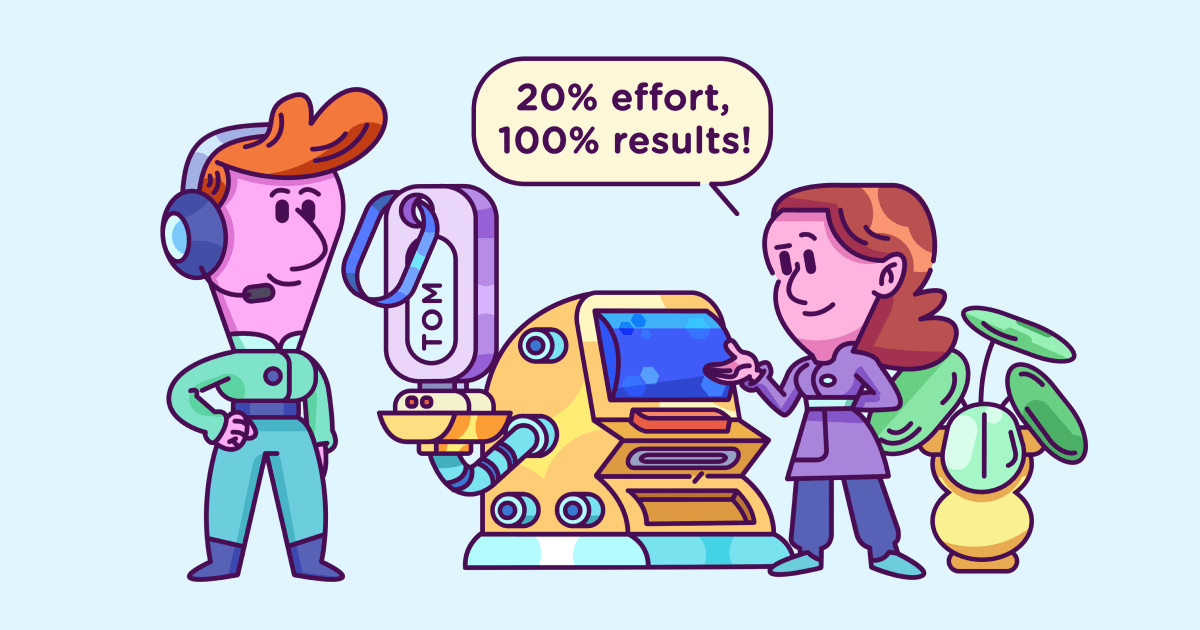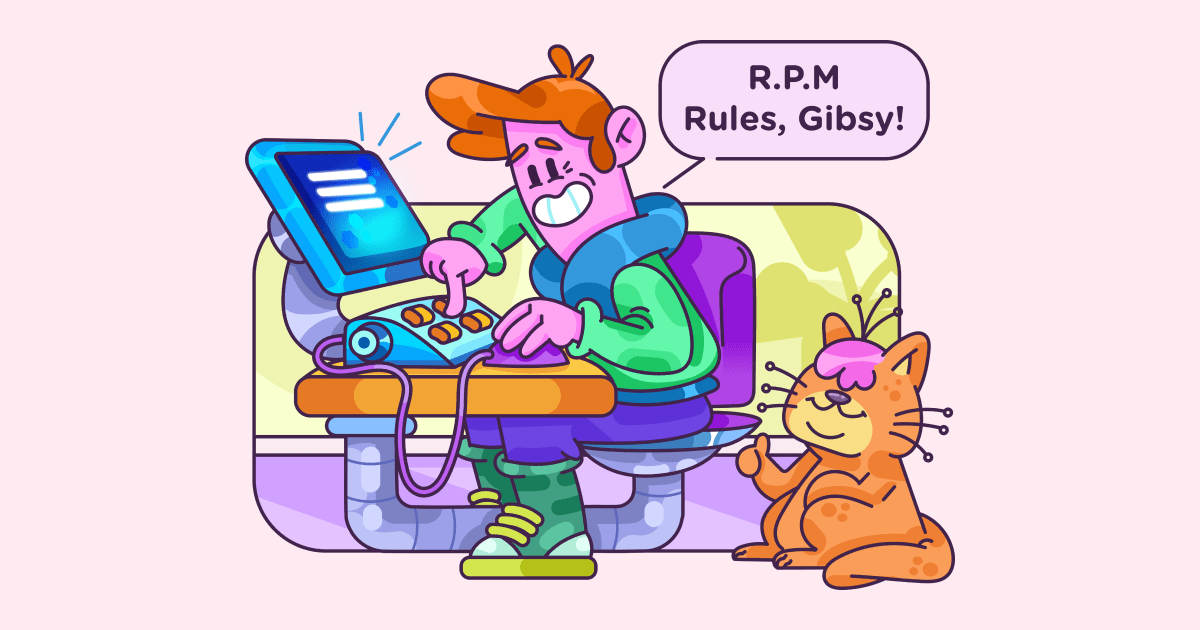17 Easy time-saving tips
Last updated on: March 31, 2022
A few years ago I saw a picture that circulated on social media that said “You have the same number of hours in a day as Beyonce”.
While that is motivating, it’s only partially true – yes, even the most successful people in the world have only 24 hours in a day, but it overlooks the fact that those people don’t have to spend their time on things like doing laundry or waiting for a bus.
Even though we don’t have the whole team of professionals working for us as they do, there are things we can do to save time.
In this article, we’ll go over 17 time-saving tips that will help you spend more of your most precious resource on things that matter to you.

Table of Contents
1. Track your time
Before we go into any of the tips we’ll talk about, as a starting point, it’s important to know what exactly you are spending your time on. The easiest way to do it is to track your time.
You can do it using pen and paper or in a spreadsheet, but it’s way less time-consuming to use a time tracking app. Using an app will allow you to see all the data in an organized way so you can analyze how you spend your time.
Is there something you should spend more/less time on? Can you organize your time more effectively? What changes can you make in your schedule so it will suit your needs better?
💡Trying to decide what app(s) would be the best for you? You might find this blog post useful:
35 best apps for time management in 2021
2. Build time management skills
Whatever you do, being good at time management is important. It helps you get more done in less time, achieve your goals, and be less stressed.
You should know how to properly set goals, prioritize, focus, plan effectively, and organize your time.
💡If you want to learn more about time management, you should check out these blog posts:
Not procrastinating is a no-brainer way to save your time.
Try to start working on a task as early as you can. It’s easier to work on something a little bit every day than waiting for the last minute and stressing yourself out.
I’m a procrastinator by nature but I also refuse to work at night instead of sleeping. In addition, I can’t work under too much pressure because I can’t handle stress well and I start panicking.
The solution I came up with is to trick myself into being organized. I do it by making a game out of it. If I manage to do a task in X amount of time, I reward myself. I also have a points system (depending on how satisfied I am with my work; I also get extra points if I finish early). The more points I get, the bigger my reward is. Time management doesn’t have to be serious and boring.
3. Do one big task before lunch
Our focus is not the same throughout the day. It’s best in the morning when our mind is still fresh and well-rested. You should use this time to work on the biggest and the hardest task of the day: you will focus easier and it will take less time to finish it.
Finishing the biggest task within the first few hours of your workday will give you a sense of accomplishment and motivate you to be productive for the rest of the day.
4. Know when you’re the most productive and make a schedule around it
Some people prefer waking up early and they’re the most productive in the morning. Others function better at night. Figure out if you’re an early bird or a night owl – or maybe a day pigeon who likes waking up and going to bed at a reasonable time.
Make a schedule that compliments your natural rhythm; if you’re a night owl, waking up at 5 AM will only make you grumpy and less efficient. Similarly, if you’re a morning person, you won’t be able to accomplish anything late at night.
Make sure that 1) your schedule works for you and 2) that you’re getting enough sleep.
5. Take advantage of technology
One of the perks of living in the 21st century is that you can do a lot of things from the comfort of your own home, using the Internet.
Take advantage of that. Pay your bills online instead of going to the bank or post office (you’ll also avoid waiting in the queue) or even automate it.
You can also shop and, in a lot of cases, work online. Not only does it save time, but it’s also much safer during the situation we’re in.
There are a lot of apps that make your life easier and help you be faster and more productive. Whatever you need, there’s probably an app for that, from to-do and calendar apps to a variety of automation apps.
6. Kill two birds with one stone
We all know that multitasking is not a stellar idea if you want to be productive – you are more effective when you focus on only one task at a time. That applies to switch tasking or (as the name says) switching from one task to another and losing a lot of focus in the process.
Multitasking is not always bad. If two tasks don’t tax the same parts of your brain, it’s a good way to save time. For example, cleaning and listening to an audiobook.
Another example is going for a walk with a friend: you get some physical exercise, catch up, and enjoy the nice weather.
If you have to commute to get to work, you have plenty of options to make that time more useful and/or less boring: if it’s close, you can take a walk or ride a bike. If you’re catching a bus or a train, you can read the news or a book, listen to podcasts, or answer emails.
If you need more rest, just relaxing and listening to music or even doing simple mindfulness exercises while going to work are perfectly fine options, too.
Think about what you need more of and try to implement it in something you’re already doing.
7. Preparing in advance is the key
By preparing in advance, you’re more likely to get the best use out of your time. Here are two examples.
Preparing for meetings
If you’re holding a meeting, make sure everyone knows what the meeting is going to be about so they can come prepared. Keep your meetings as concise and focused as possible; long and unnecessary meetings waste everyone’s time. If everyone comes prepared, you can get straight to the point and solve a problem in significantly less time.
(Also, if the meeting can be an email, it should be an email.)
Preparing for lessons as a student
If you’re a student, you should show up somewhat prepared for the lessons. I know staying on top of your schoolwork is not easy – I was a student until recently. That’s how I know this helps a lot.
It makes it easier for you to learn during the lesson, which means spending less time studying at home and/or right before the exam. You will also know if you don’t understand something, so you can ask the professor right away and save yourself the trouble down the road.
You already have to attend the lessons, make the most out of them. They take a significant portion out of your day: don’t waste that time.
8. Learn to say no
Saying yes to everything is a sure way to burnout and overwork yourself, as well as spend your time on things you don’t want or need to do.
You shouldn’t give portions of your time away like they’re free Costco handouts; your time and energy are a valuable, limited resource and you should treat them as such.
You can’t say no in all circumstances, especially at work, but often you can.
You know when everything in you wants to say no, but you end up saying yes because you feel bad? Here are some things that might help:
- Be assertive, but polite and diplomatic: give a good reason (not an excuse) for why you need to say no.
For example, “Thank you for thinking of me for this, but I’m already working on two big projects so I, unfortunately, don’t have time for any additional work. I don’t want to compromise the quality of anything I’m working on”. - You don’t need to go into too much detail. For example: “Sorry, I can’t, my sister is in town with her kids and I haven’t seen them in months and I honestly feel so bad about it, especially because they live only an hour away and there’s really no excuse but I also always delay getting my car fixed and…” is too much.
“Thank you for inviting me, but I can’t – my sister and her kids are in town and I’m spending this weekend with them” is just enough. - Offer an alternative or an idea on how to get the job done in another way (without involving you). It can be as simple as “My schedule is jam-packed on Thursday, but I’m free on Sunday if that works for you”.
- Practice – the more you practice, the easier it will be and the better you’ll get.
9. If it takes less than 5 minutes, do it right away
Small tasks can add up quickly, especially if we tend to procrastinate. You can avoid that by getting into the habit of doing the tasks immediately if they take less than 5 minutes.
Washing your coffee mug or a plate only takes a minute, maybe two; if you wait until your sink is overloaded with dirty dishes, it will take you significantly more time (and they will ruin your mood every time you look at them).
At first, it’s hard to get out of the habit of saying “I’ll do it in 10 minutes… I know I said that 10 minutes ago too, but this time for real”.
What helped me is Mel Robbins’ 5 seconds rule: when you have the instinct to do something, react within 5 seconds or your brain will convince you that you do it in 5 minutes… or 10… or 110.
Maybe you won’t feel the instinct to pay a bill, but when you remember it, do it right away.
Yes, this applies to getting out of bed too. Don’t snooze the alarm. According to experts, repeatedly hitting the snooze button can lead to extended periods of sleep inertia (feeling of grogginess after waking up). It also messes with your sleep cycles, which is bad for both your mind and your body.
10. Prepare the night before
Mornings can be hectic – to avoid additional stress and save a significant amount of time, prepare everything the night before.
- Write a to-do list so when you wake up, you already know what you have to do.
- Prepare what you are going to wear the night before and iron it if necessary. There’s nothing more frustrating than being in a rush and realizing what you wanted to wear is wrinkly or has a stain.
- You can even prepare your breakfast the night before, for example, overnight oats or muffins.
- If you like switching your purses to go with your outfits, make sure you packed everything you need for the day. You can also buy multiples of small things you always carry with you (paper tissues, gum, masks, lip balm, etc) and put them in every bag.
In the morning, we are faced with many decisions to make – and we can only make a limited amount before we reach the decision fatigue. In addition to that, it’s harder to think when you’re still half asleep. That’s why mornings go way smoother and faster when you prepare everything the night before.
11. Limit the number of decisions you make
Speaking about decision fatigue, another way to save your time and mental energy is to simply limit your choices.
When they asked Mark Zuckerberg why he’s wearing the same thing every day, he said: “I really want to clear my life to make it so that I have to make as few decisions as possible about anything except how to best serve this community.”
I am not saying you should start wearing the same thing every day too. It would, however, be a good idea to limit the number of decisions you need to make by doing the following:
- Create routines so you don’t have to rack your brains deciding when you’ll wake up, what skincare products you’ll use or what exercises you should do.
- You can either 1) make a capsule wardrobe with pieces you like and feel good in. Make sure they all go with each other so no matter how you combine them, you’ll have a put-together outfit, or
2) if you like fashion and enjoy having a lot of clothes, try making outfits out of them in advance, so you have go-to options when you’re in a hurry. - Have a checklist for groceries you always buy instead of writing a new list every time and wondering if you forgot to add something.
- Have a list of healthy, filling, and fast options for every meal. I love experimenting and trying new food, but when I’m short on time, it’s easier to choose from 3-4 options I have for lunch depending on my mood, instead of choosing from everything I’ve ever eaten.
12. Cook in bulk
Another time-saving tip related to food is to cook in bulk.
You will spend the same amount of time cooking whether you make one or 5 portions, but by making the bigger amount of food and saving it for later, you will cut down on cooking time for the next couple of days.
13. Reduce your social media consumption
Endless scrolling is often the one to blame for the majority of the time we waste.
The only way to combat it is to limit the time we spend on social media. Here’s how:
- Check your screen time and how much of that time is spent on social media. Warning: the numbers may not be easy to face.
- Turn off notifications. Not only that you’ll have fewer distractions, but you’ll also avoid the “I unlocked my phone just to answer the message and an hour later I’m still on social media” scenario.
- Set rules for yourself for when you can and cannot check your phone. For example, “I can’t go on social media before I do my morning routine” or “I can’t go on Instagram when I’m working except on the lunch break”.
- Out of sight, out of mind – if you can, don’t keep your phone next to you. Put it in another room or in your purse.
14. Spend less time on emails
Similarly to having a limited time frame for social media, you should set the time when you answer emails. It may be once, twice, or four times a day, depending on the number of emails you typically get. Choose those times wisely: don’t waste the period of your best focus on emails, but rather on a more important and/or harder task.
Other ways to spend less time on emails are:
- Use templates. If you catch yourself answering the same thing over and over again, make a template instead of always typing out the same thing.
- Keep in mind that it’s easier to find the email you want by using the search bar than manually organizing emails in folders.
- Don’t answer if you don’t need to. Sounds obvious, but sometimes we need a reminder.
- Unsubscribe for the newsletter you’re no longer interested in.
15. Batch similar tasks together
If you have to print multiple things, print them at the same time. If you have to make multiple phone calls, make them all in one sitting. If you have to buy multiple things, buy them in one shopping trip. If you have to create one week’s worth of content for social media, pick one day and do it all at once.
Not only you’ll do it more efficiently because you’ll be in the right headspace, but you’ll also save a lot of time on seemingly small things that would otherwise add up. Why would you go to the printer and back to your desk, log in and out, get ready, drive to the mall, etc. 5 times when you can do it once?
16. Have a designated workspace
If you’re working from home, don’t work from your bed. Find a place specifically for work, preferably a desk. That way, when you sit at your desk, your brain knows you mean business and you’ll get in a work mode faster. Working from bed can also decrease sleep quality: your brain should associate bed with sleep and rest, not wakefulness, concentration, and working.
Keep your workspace clean and organized. It should only contain the things you need for work, with no unnecessary items to avoid distractions.
The same goes if you’re a student: if you want to study effectively, study at your desk, not laying in your bed.
17. Hire someone
You should consider hiring someone to help you out if you’re in a financial position to do so. Whether it’s someone for the long term (virtual assistant, housekeeper, financial advisor) or just occasionally (repairman or catering service), the time you save is worth the money that you spend.
This especially applies to small business owners. When you are just starting out, you have to do almost everything by yourself but as your business grows, aim to delegate more and more things to professionals.
Conclusion
Even though our lives are often hectic, there are ways to spend less time on unnecessary things and more time on the ones we value. The most important thing is working on our time management skills, from learning to say no to making sure we’re always prepared. It may seem impossible at times, but all it takes is good organization and discipline.
(At least until we become rich enough to hire people to do everything we don’t want to.)
What tip did you find the most useful? What helps you the most to save time? Write to us at blogfeedback@clockify.me.





